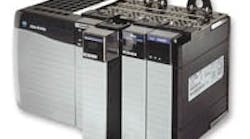Many plants are hybrids of continuous, batch and discrete systems, and in any given part of the plant, youre likely to find some combination of PLCs, serial I/O and many old legacy workhorses.
The connectivity solutions probably include an ensemble of hard wiring, serial protocols and an industrial fieldbus, including the more recent introduction of Ethernet to the plant floor. The members of this ensemble dont generally talk to each other very much.
We can expect this issue to grow more difficult as more devices on the plant floor are networked via Ethernet TCP/IP protocol, including the burgeoning number of OPC servers that are being located on plant networks.
Woodhead Industries, a division of Molex, wants to continue the process of making these types of data exchanges easier. The company introduced BradCommunications SST Modbus and Modbus TCP network interface modules to provide a fast and easy way to connect Modbus networks to Allen-Bradley ControlLogix systems.
When the ControlLogix processor combines with the SST module, users benefit by quickly and easily being able to communicate with Modbus and Modbus TCP in a reliable and effective manner, says Eric Gory, product manager, Woodhead Industries. The SST modules are available in two versions. The SST-SR4-CLX-RLL module offers four independent RS232/RS485 serial ports operating as master and/or slave Modbus protocols that support ASCII and RTU formats. The SST-ESR2-CLX-RLL module provides two serial portsusing the same features as the SST-SR4-CLX-RLLand an Ethernet port executing Modbus TCP [UDP and IP] protocol in both client and server modes simultaneously.
Woodhead says the modules are quick to implement in a control application, as the SST modules enable the sharing of process I/O data directly with the ControlLogix processors memory without writing any ladder logic.
The configuration setup to exchange data between the Modbus and Modbus TCP devices and ControlLogix is accomplished through the use of a Windows software console that supports the Allen-Bradley Remote Link Library (RLL) feature, allowing remote monitoring and downloading of changes to the network configuration, says Gory. The configuration also can be stored on a USB memory stick, plugged into the SST module and loaded during the boot.
The SST modules also can act as a gateway. One example where this feature can be applied is the reading of the data from a serial Modbus slave and then writing it through the Ethernet Modbus TCP port, says Gory. This function is achieved through the use of the SST modules internal database of 32K words and 32K bits that can also be shared with the ControlLogix processor.
Applications for which the BradCommunications SST Modbus and Modbus TCP network interface modules can be used include food processing, mining, building automation, petrochemical and manufacturing industries, says Gory.
Because the SST module comes with four independent serial ports/channels, its easier to support the connection of multiple point-to-point serial devices, continues Gory. This allows the integration of legacy equipment as well as providing a bridge between Rockwell Automation networks and Modbus-compatible devices. When used with the Allen-Bradley ControlLogix, communication with more than 20 types of system networks individually or simultaneously is possible.
For more information call 519/725-5136, e-mail [email protected] or browse to www.woodhead.com.




